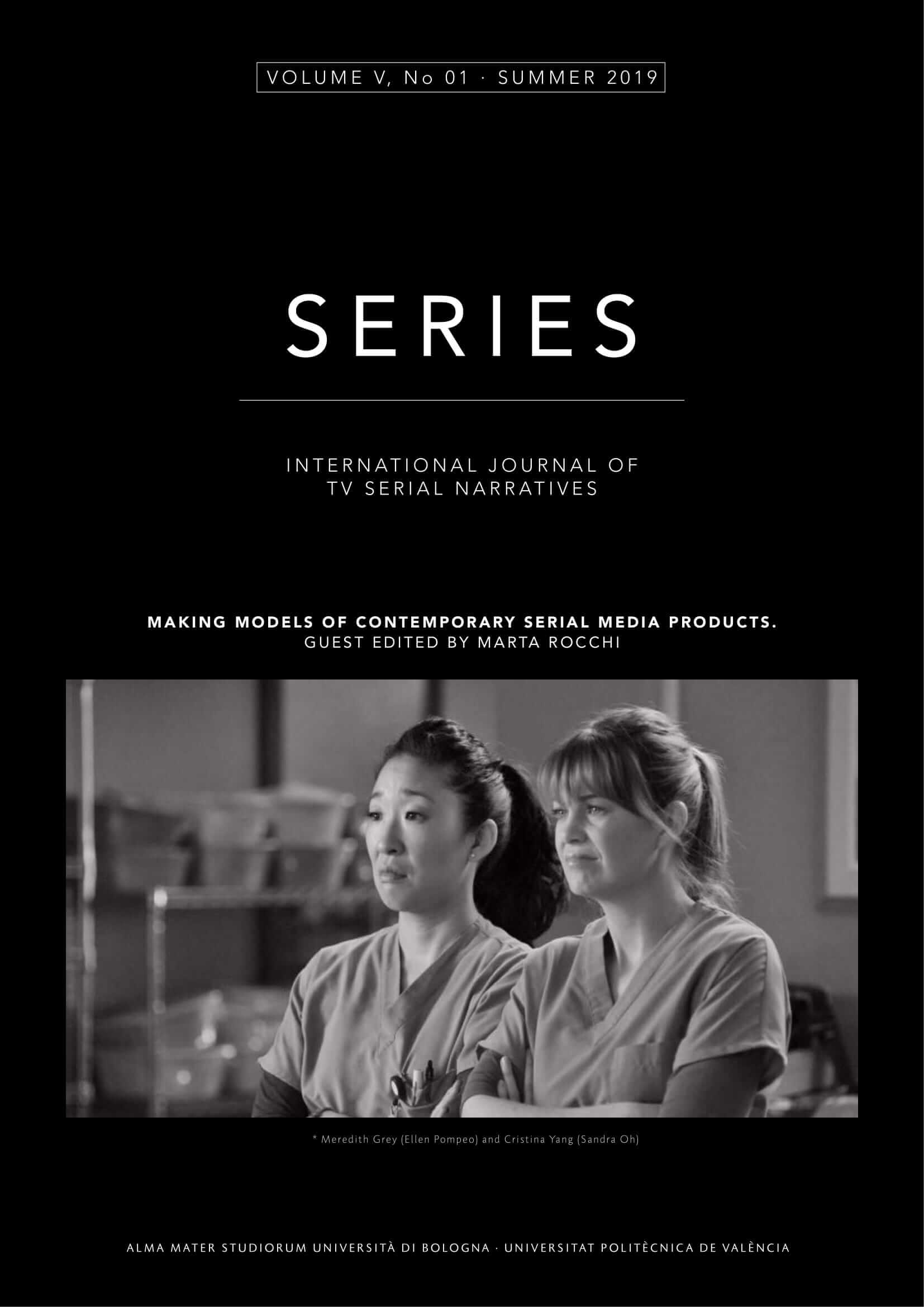Insights into serial narratives through qualitative modelling techniques
DOI:
https://doi.org/10.6092/issn.2421-454X/9354Keywords:
Narrative ecosystem, Qualitative modeling, Serial narrativesAbstract
Serial narratives can often be seen as narrative ecosystems with a long lifespan and whose transformation and evolution can be based on external factors (relating to their media, economic and reception contexts) as well as internal ones (narrative aspects, the evolution of characters and of the plot). Considering the paradigm of narrative ecosystems, this work is a preliminary investigation regarding serial narratives, conducted through the application of a qualitative modeling technique (loop analysis), developed within the ecological domain.
Loop analysis is proposed as an innovative method for the analysis of narrative ecosystems, and its aim is to reconstruct their evolutionary dynamics through the implementation of models able to consider the heterogeneity of all the possible variables (narrative, text, productive, economic spheres etc.). This paper presents two goals: (i) highlighting, through a step-by-step methodological process, the systemic approach of loop analysis, which could help to identify successful trends by modeling them in an evaluative/predictive perspective, and (ii) preliminarily applying said method to the TV series Game of Thrones (HBO, 2011-), which will be considered as a case study.References
Angraal, Suveen et al. (2018). “Risk Factors Associated with Mortality in Game of Thrones: A Longitudinal Cohort Study.” https://arxiv.org/abs/1802.04161 (last accessed 26-06-19).
Beveridge, Andrew and Jie Shan (2016). “Network of thrones.” Math Horizons 23(4): 18-22. https://doi.org/10.4169/mathhorizons.23.4.18.
Bodini, Antonio, Cristina Bondavalliand Stefano Allesina (2007). L'ecosistema e le sue relazioni: idee e strumenti per la valutazione di impatto ambientale e di incidenza. Milano: Franco Angeli.
Bodini, Antonio, Marta Rocchi and Marco Scotti (2017). “Insights into the ecology of the Black Sea through the qualitative loop analysis of the community structure.” Limnology and Oceanography 63(2): 968-84. https://doi.org/10.1002/lno.10713.
Brembilla, Paola (2018). “Tecnologia, istituzioni, industria: l’ambiente economico e normativo degli ecosistemi narrativi.” In Ecosistemi Narrativi. Dal fumetto alle serie TV, edited by Guglielmo Pescatore, 93-107. Roma: Carocci.
Casoli, Sara (2017). “L’anomalia emotiva di Game of Thrones: coinvolgimento del pubblico e design della narrazione.” In Game of thrones. Una mappa per immaginare mondi, edited by Sara Martin and Valentina Re, 45-62. Milano-Udine: Mimesis.
Cogman, Bryan (2012). Inside HBO’s Game of Thrones. San Francisco: Chronicle Books.
Ferreday, Debra (2015). “Game of Thrones, rape culture and feminist fandom.” Australian Feminist Studies 30(83): 21-36. https://doi.org/10.1080/08164649.2014.998453.
Frankel, Valerie Estelle (2014). Women in Game of thrones: power, conformity and resistance. Jefferson: McFarland.
Freistetter, Florian and Ruth Grützbauch (2018). “Sitnikov in Westeros: How Celestial Mechanics finally explains why winter is coming in Game of Thrones.” https://arxiv.org/abs/1803.11390 (last accessed 26-06-19).
Innocenti, Veronica and Guglielmo Pescatore (2012a). “Information Architecture in Contemporary Television Series.” Journal of Information Architecture 4(1-2): 57-72.
Innocenti, Veronica and Guglielmo Pescatore (2012b). Le nuove forme della serialità televisiva. Storia, linguaggio e temi. Bologna: CLUEB.
Innocenti, Veronica and Guglielmo Pescatore (2018). “The Evolution of Characters in TV Series: Morphology, Selection, and Remarkable Cases in Narrative Ecosystems.” In Reading Contemporary Serial Television Universes edited by Paola Brembilla and Ilaria A. De Pascalis, 93-110. London: Routledge.
Irwin, William and Henry Jacoby (eds.). (2012). Game of Thrones and philosophy: Logic cuts deeper than swords (Vol. 51). John Wiley & Sons.
Levins, Richard (1966). “The strategy of model building in population biology.” American scientist 54(4): 421-31.
Levins, Richard (1974). “Discussion paper: The qualitative analysis of partially specified systems.” Annals of the New York Academy of Sciences 231(1): 123-38.
Levins, Richard (1975). “Evolution in communities near equilibrium.” In Ecology and evolution of communities, edited by Martin L. Cody and Jared M. Diamond, 16-50. Harvard: Harvard University Press.
Marino, Matteo and Claudio Gotti (2016). Il mio primo dizionario delle serie TV cult. Da Twin Peaks a Big Bang Theory. Verona: Becco Giallo.
Martone, Rebecca, Antonio Bodini and Fiorenza Micheli (2017). “Identifying potential consequences of natural perturbations and management decisions on a coastal fishery social-ecological system using qualitative loop analysis.” Ecology and Society 22(1): 34. https://doi.org/10.5751/ES-08825-220134.
Ortiz, Marco and Matthias Wolff (2002). “Application of loop analysis to benthic systems in northern Chile for the elaboration of sustainable management strategies.” Marine Ecology Progress Series 242: 15-27. https://doi.org/10.3354/meps242015.
Pérez, Héctor J. (2013). “Game of Thrones: l’ecosistema prima della première.” In Media Mutations. Gli ecosistemi narrativi nello scenario mediale contemporaneo. Spazi, modelli, usi sociali, edited by Claudio Bisoni and Veronica Innocenti, 231-240. Modena: Mucchi Editore.
Pescatore, Guglielmo, Veronica Innocenti and Paola Brembilla (2014). “Selection and Evolution in Narrative Ecosystems: A Theoretical Framework for Narrative Prediction”. IEEE International Conference on Multimedia and Expo Workshops, 1-6. https://doi.org/10.1109/ICMEW.2014.6890658.
Pescatore, Guglielmo (edited by) (2018). Ecosistemi Narrativi. Dal fumetto alla serie TV. Roma: Carocci.
Pescatore, Guglielmo and Marta Rocchi (2018). “Dalle definizioni ai modelli degli ecosistemi narrativi. Prospettive di ricerca.” In Ecosistemi Narrativi. Dal fumetto alle serie TV, edited by Guglielmo Pescatore, 229-44. Roma: Carocci.
Picone, Marco (2014). “Il trono di spade. Geopolitica e ombra del potere nel fantasy.” In Schermi americani. Geografia e geopolitica deli Stati Uniti nelle serie televisive, edited by Fabio Amato and Elena Dell’Agnese, 27- 38. Milano: Edizioni Unicopli.
Poli, Chiara (2015). Il mondo de Il Trono di Spade. Eroi, guerrieri e simboli dei Sette Regni. Milano: Sperling & Kupfer Editori S.p.A.
Puccia, Charles J. and Richard Levins (1985). Qualitative modeling of complex systems. Cambridge: Harvard University Press.
Rocchi, Marta (2017). Ecosystem response to perturbations: insight from qualitative analysis. PhD dissertation. Ferrara: University of Ferrara.
Ruffino, Marco and Paola Brembilla (2016). “Narrative ecosystems through the network analysis lens. Step one: The production of US TV series, between capital and labor strategies.” SERIES-International Journal of TV Serial Narratives 2(1): 55-68. https://doi.org/10.6092/issn.2421-454X/6164.
Ryan, Maureen and Cynthia Littleton (2017). “TV Series Budgets Hit the Breaking Point as Costs Skyrocket in Peak TV Era.” https://variety.com/2017/tv/news/tv-series-budgets-costs-rising-peak-tv-1202570158/ (last accessed 19-02-19).
Downloads
Published
How to Cite
Issue
Section
License
Copyright (c) 2019 Marta Rocchi, Jessica Chiarello
Copyrights and publishing rights of all the texts on this journal belong to the respective authors without restrictions.
This journal is licensed under a Creative Commons Attribution 4.0 International License (full legal code).
See also our Open Access Policy.





